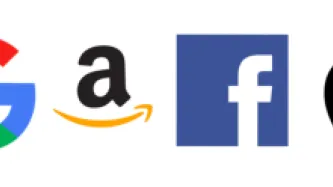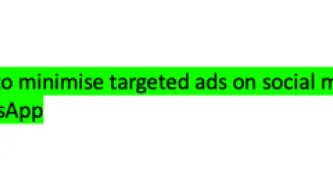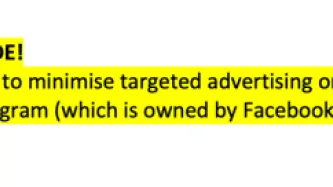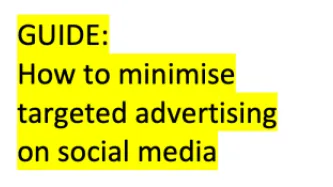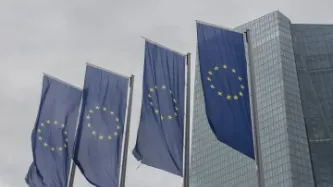Advanced Search
Content Type: Examples
In a December 2018 update, Facebook so effectively disguised sponsored posts that it took AdBlocker Plus a month, instead of the more usual few days, to find a way to counter it. Facebook has responded to the threat posed to its business model by adblockers by both providing users with advertising settings and tweaking its code to keep adblockers from working on the site. Federal Trade Commission rules require Facebook ads to be clearly labelled as such, but the adblocking arms race has…
Content Type: Examples
In November 2018 the campaign group Freedom from Facebook used the social network's own advertising tools to promote a "safe space" website where they can submit whistleblower tips anonymously. Facebook declined to comment but did not appear to be blocking the ads nor keeping a log of who viewed them. One leak suggested that recent scandals, including the Cambridge Analytica affair, had led to a rise in the percentage of staff who said they were optimistic about the company's future. The PR…
Content Type: Examples
Days after the 2018 shooting that killed 11 Jewish congregants in a Pittsburgh synagogue, The Intercept found that Facebook still allowed advertisers to choose "white genocide conspiracy theory" as a targeting criterion, capturing 168,000 members of the social network. The technique used was the same as the one Pro Publica had discovered a year earlier that showed that "Jew hater", "How to burn Jews", and "History of 'why jews run the world'" were acceptable to Facebook as selection criteria…
Content Type: Long Read
CEOs of the big tech companies have all recently discovered the value of privacy. On Tuesday, 30 April 2019, Mark Zuckerberg, announced his future plans to make Facebook a "privacy-focused social platform". This was followed by Google's Sundar Pichai demand that “privacy must be equally available to everyone in the world.” Meanwhile, Twitter's Jack Dorsey, has described the General Data Protection Regulation (GDPR) as "net-positive", while Apple had already positioned itself as the champion of…
Content Type: Examples
In December 2018 Facebook revealed that over a 12-day period in September a software bug may have wrongly allowed about 1,500 third-party apps to access 6.8 million users' photos, including some that people began uploading to the social network but didn't go on to finish posting. EPIC executive director Marc Rotenberg said the incident offered more evidence that Facebook has violated the terms of its 2011 agreement with the US Federal Trade Commission. In May, Facebook suspended some 200 games…
Content Type: Examples
Facebook has taken down 65 accounts, 161 pages, dozens of groups and four Instagram accounts, which were ran by Archimedes Group, an Israeli political consulting and lobbying firm that aimed at disrupting elections in various countries.
Archimedes was mostly active in Sub-Saharan Africa but also some part of Southeast Asia and Latin America. According to Facebook, the accounts taken down were attempting to influence people in Nigeria, Senegal, Togo, Angola, Niger and Tunisia. But the most…
Content Type: Explainer
It’s tough to minimise targeted ads on phones because ads can be delivered based on data from the device level (such as what operating system your phone is using or based on unique numbers that identify your phone), browser level (what you search for within a browser), and within the apps you use. An app could target ads at you based on your location (tied to your unique device id number(s)) for example. Apps, including Instagram, direct you to opt-out of targeted ads at the device level. Here'…
Content Type: Examples
The rise of social media has also been a game changer in the tracking of benefits claimants. Back in 2009, the case of Nathalie Blanchard a woman in Quebec who had lost her disability insurance benefits for depression because she looked “too happy” on her Facebook pictures had made the news.
https://abcnews.go.com/Technology/AheadoftheCurve/woman-loses-insurance-benefits-facebook-pics/story?id=9154741
Author: Ki Mae Heussner
Publication: ABC News
Content Type: Examples
Before and after the Italian election on 4 March 2018, concerns were raised about the spread of misinformation, disinformation and inflammatory content through a network of news sites and Facebook pages.
In November 2017, in the run up to the election, Buzzfeed reported on links between a large network of Italian news websites (175 domain names) and Facebook pages owned by a media network company Web365 – that represents one of the most popular alternative media operations in Italy including…
Content Type: Examples
In an experiment conducted by Fabio Chiusi and Claudio Agosti during the 2018 election season and set out in detail in their report for Tactical Tech, the duo sought to investigate the Facebook algorithm that powers users’ news feed and the algorithm’s treatment of political content. One of the experiment’s goals was to observe how perception of reality is algorithmically shaped in the context of an electoral campaign. In order to do this, Chiusi and Agosti created six bot accounts on Facebook…
Content Type: Explainer
It’s tough to minimise targeted ads on phones because ads can be delivered based on data from the device level (such as what operating system your phone is using or based on unique numbers that identify your phone), browser level (what you search for within a browser), and within the apps you use. An app could target ads at you based on your location (tied to your unique device id number(s)) for example. Apps, including Instagram, direct you to opt-out of targeted ads at the device level.…
Content Type: Long Read
“Truth exists, but you have to find it”, Oleksandra Matviychuk of Ukraine’s Center for Civil Liberties told me as I interviewed her in central Kyiv one week before the 2019 Ukrainian run-off election, “and in order to do so you have to make some effort”. We’re talking about her experience working on the ground in Ukraine, a country with a long history of battling against disinformation.
Activists in Ukraine have long experience navigating the noisy and chaotic environment that disinformation…
Content Type: News & Analysis
Mr. Zuckerberg has discovered the usefulness of regulation to protect our personal data. After years of lobbying against the adoption of the EU General Data Protection Regulation (GDPR) and of lamenting the ills of its implementation, Facebook seems ready to embrace European data protection law and even spread it across the world. Similar sentiments were recently expressed by Twitter.
This is a welcome change. Maybe the fines recently imposed by regulators and the increased scrutiny of…
Content Type: Examples
In February 2019, an examination of Facebook's searchable database of Indian political ads showed that in India political ads on Facebook were viewed nine times more often by men than by women. Facebook's Indian user base was reported as 24% female in 2016. The reason for the disparity in ad viewing is unclear: deliberate gender-based targeting of Facebook users, the demographics of the population attracted by the pages on which the ads appear, or the levels of Facebook penetration in the…
Content Type: Examples
In January 2019, Facebook announced that as of February 28 the site would add more information to that displayed when users click on the "Why am I seeing this?" button that appears next to ads on the service. Along with the brand that paid for the ad, some of the biographical details they'd targeted, and whether they'd uploaded the user's contact information, Facebook would also show when the contact information was uploaded, whether it was by the brand or one of their partners, and when access…
Content Type: Examples
In January 2019, the British transparency NGO WhoTargetsMe, Mozilla, and the US investigative journalism site Pro Publica reported that recent changes in the social network's code were restricting their ability to monitor political ads on Facebook. The company said the changes were part of a crackdown on third-party plug-ins such as ad blockers and ad scrapers accessing data on the site without authorisation; however, the 20,000 users of WhoTargetsMe's plug-in had specifically chosen to share…
Content Type: Examples
In January 2019, Facebook announced it would extend some of the rules and transparency tools it developed for political advertising for upcoming spring elections in Nigeria, Ukraine, India, and the EU. In Nigeria, the site will bar electoral ads from advertisers outside the country where the election is being held, build a searchable library of electoral ads and retaining them for seven years, check the identity of individuals buying political ads against government-issued documents, and…
Content Type: Examples
In January 2019, Facebook' announced it had removed multiple pages, groups, and accounts coordinating inauthentic behaviour on Facebook and Instagram that were set up by two unrelated operations originating in Russia. One of these operated 364 pages and accounts was active in the Baltics, Central Asia, the Caucasus, and Central and Eastern European countries; the other ran 107 Facebook pages, groups, and accounts, as well as 41 Instagram accounts, and was specific to Ukraine. The company…
Content Type: Examples
In a November 2017 report, Facebook's security group outlined the steps it would take to combat new forms of misuse of the platform, including attempts to deceive people and manipulate civic discourse at low cost or risk to the organisers. Among the drivers, the group cited the global reach Facebook affords and the fact that everyone on social media can act as an amplifier. The group said it intended to collaborate with others to find industry solutions to fake news; disrupt economic incentives…
Content Type: Examples
In 2019, a prominent page on the Facebook Business site cited the British Conservative Party as a "success story" at the 2015 general election, which put the party into power with a narrow majority. The site boasted that via Facebook the Conservatives had an 80.6% reach in key constituencies, 3.5 million video views, and a social context for 86.9% of all the ads served - and that as a result the party had defied the polls and achieved an outright majority.
https://en-gb.facebook.com/business/…
Content Type: Examples
A December 2018 analysis found that Facebook's measures for improving election security and discouraging anonymous political messages were poorly executed and inconsistently applied, and placed an unfair burden on charitable organisations and small businesses while simultaneously being easy for organised and well-funded actors to bypass. Facebook blocked non-profits such as New York's Nuyorican Poets Cafe, Arts Japan 2020, and the Boston Museum of Fine Arts from promoting "harmless" postings.…
Content Type: Examples
Facebook's latest tool for inspecting political ads showed that in the run-up to the US mid-term elections in November 2018, many of the same politicians who had been questioning Facebook about privacy and leaked user data were spending campaign funds on advertisements on the service. Between 2014 and 2018, the digital percentage of political spending rose from 1% to 22% (or about $1.9 billion); between May and November 2018 political spending on Facebook and its subsidiaries came to nearly $…
Content Type: Advocacy
Cases of female and gender diverse public figures being targeted with online harassment have become sadly common in the news. Female politicians are particularly affected – although journalists and in particular sports commentators are also frequently targeted as well. In some cases, the harassment goes as far death and rape threat for women and gender diverse people who dare speaking publicly. Beyond the freedom of speech implications – as we risk seeing women and gender diverse people being…
Content Type: News & Analysis
PI has today written to Google, Instagram, Snapchat, TicTok, Twitter, YouTube, and WhatsApp to ask for more information about their steps to tell people why they are seeing ads. Facebook recently announced expanding the company's ad transparency measures to include more information about why an ad or content appears in a user's newsfeed. While Facebook has a lot more to do, it is important that all technology companies provide advertising transparency.
Recently, we have seen how platforms…
Content Type: News & Analysis
This past weekend, in an Op-Ed in the Washington Post, Mark Zuckerberg called for new regulations to address harmful content, electoral integrity, privacy and data portability.
Nine years since he proclaimed that privacy is no longer a social norm, four years since Facebook noticed broadscale harvesting and exploitation of their users' data by third party companies and chose not to tell us about it, two years since he denied there were any abuses of data in political campaigns, and…
Content Type: News & Analysis
Planning and participating in peaceful protests against governments or non-state actors’ policies and practices requires the capacity of individuals to communicate confidentially without unlawful interference. From protests in support of LGBTI rights to protests against specific projects that undermine local communities’ wellbeing, these movements would not have been possible without the ability to exchange ideas and develop plans in private spaces.
Unlawful interference with…
Content Type: News & Analysis
We found this image here.
Today, a panel of competition experts, headed by Professor Jason Furman, the former chief economic adviser of in the Obama administration, confirmed that tech giants, like Facebook, Amazon, Google, Apple and Microsoft, do not face enough competition.
Significantly, the report finds that control over personal data by tech giants is one of the main causes preventing competition and ultimately innovation.
Privacy International's research has shown clear examples of…
Content Type: Long Read
(In order to click the hyperlinks in the explainer below, please download the pdf version at the bottom of the page).
Content Type: Key Resources



